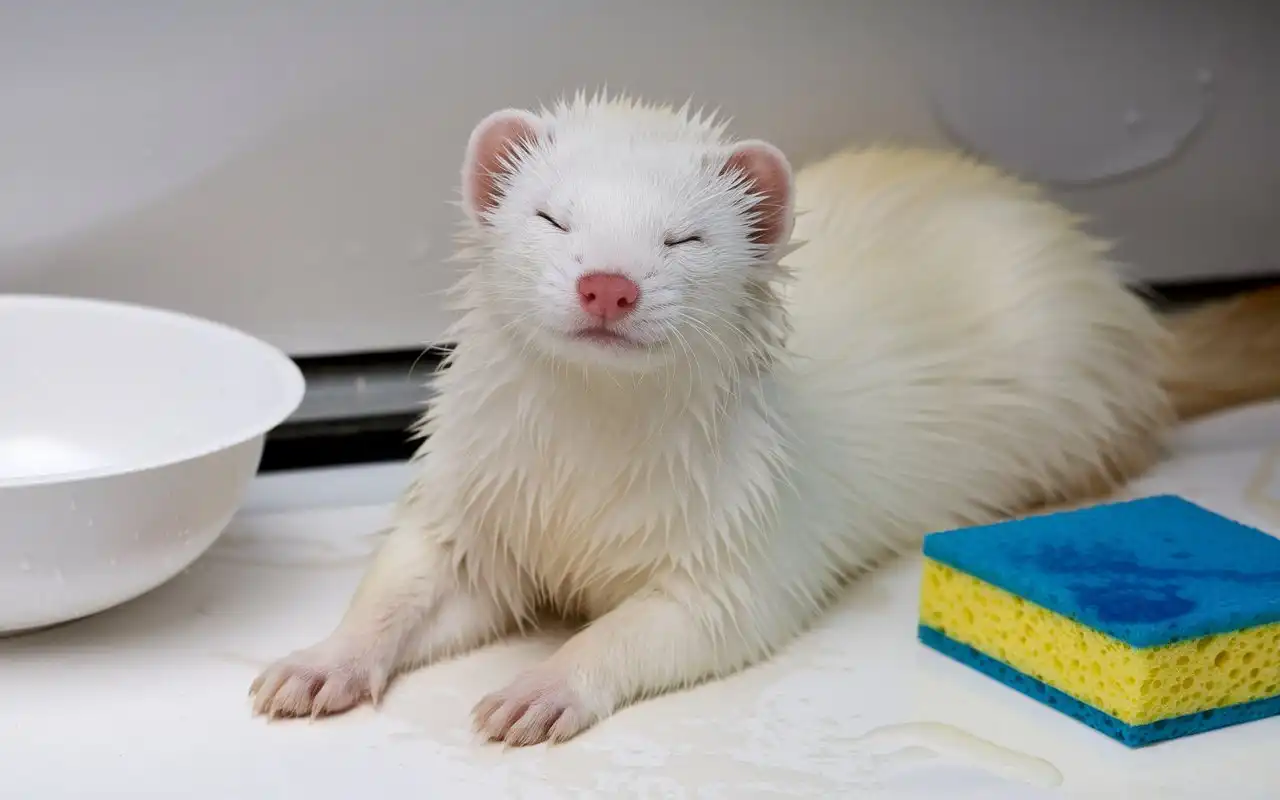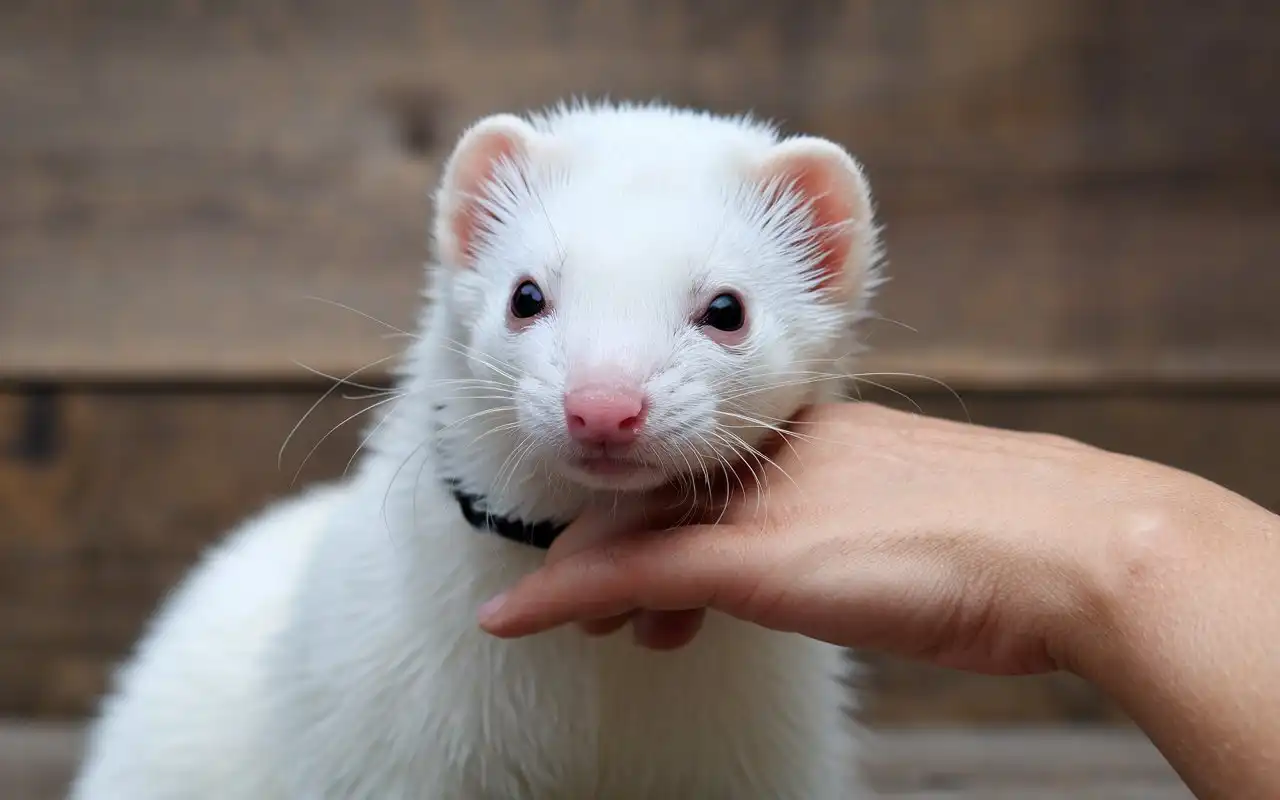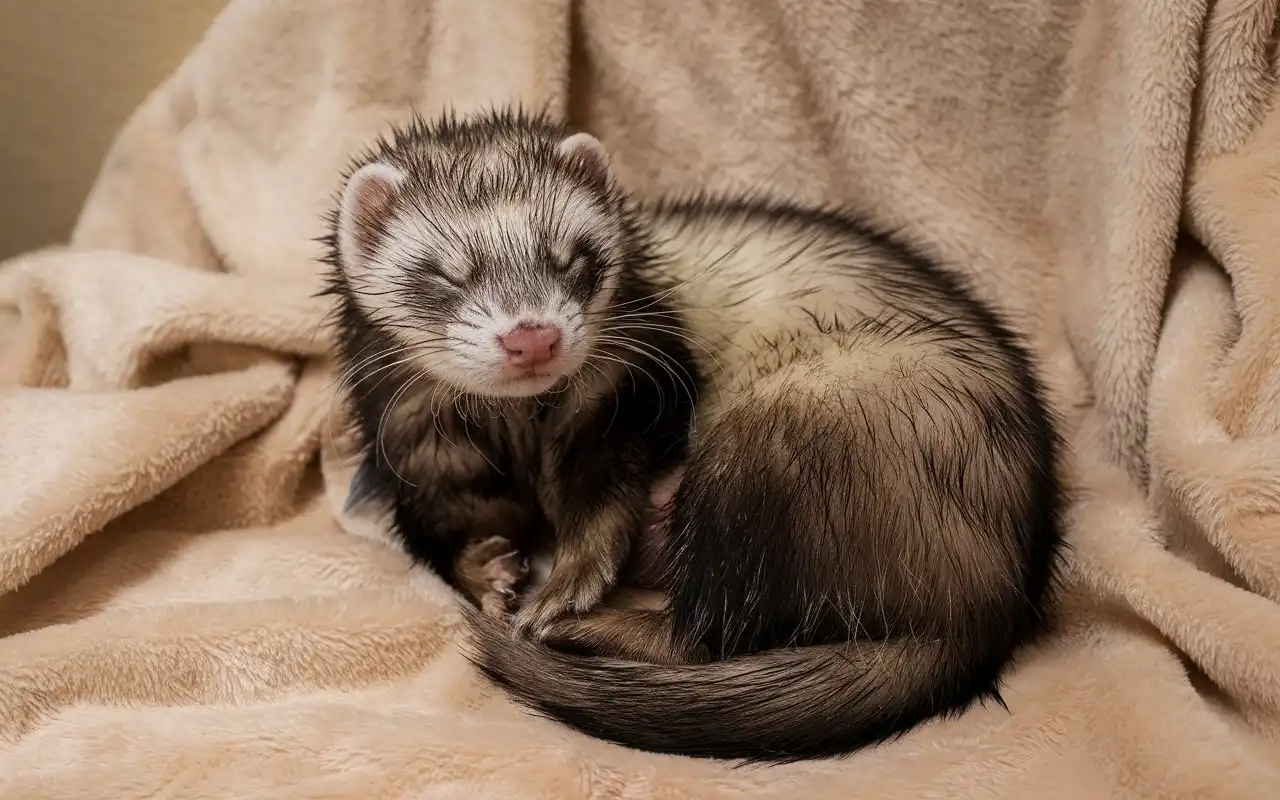Fleas on a ferret can be a challenging issue for any pet owner to tackle. These tiny parasites can cause your furry friend discomfort. They can also pose significant health risks if untreated. Fleas on a ferret are resilient and reproduce quickly. A small problem can become a widespread infestation in days. To keep ferrets healthy, you must know how to handle fleas. This means debunking myths and using effective treatments. This guide will cover all you need to know about managing and preventing flea infestations in ferrets. It will assist in maintaining your pet joyful and fit.
Table of Contents
What Are Fleas?
Fleas are small, wingless insects. They live off the blood of mammals and birds. They are known for their impressive jumping skills, which enable them to move quickly between hosts. Fleas have a tough shell that resists crushing. Their flat bodies help them move through fur. The cat flea (Ctenocephalides felis) and dog flea (Ctenocephalides canis) are the most common types that affect pets. Despite their names, both types can also infest ferrets. These pests thrive in warm, humid environments, which make homes a perfect breeding ground. Fleas find a host, feed on its blood, and lay eggs. This starts an infestation cycle that irritates your pet.



Can Ferrets Really Get Fleas?
A common misconception among pet owners is that ferrets are somehow immune to fleas. The reality, however, is that ferrets are just as susceptible to fleas as cats and dogs. Due to their active nature, ferrets often come into contact with outdoor environments or other pets that might carry fleas. Fleas can jump onto ferrets when they are exploring outside or even when they are in contact with other infested animals. Ferrets have a denser coat than some small pets. Fleas can easily hide in their fur, making infestations hard to spot until they are severe. Recognizing this vulnerability is crucial to ensure that you take the necessary steps to protect your ferret.

Common Myths About Fleas on a Ferret
Ferrets Cannot Get Fleas
This myth stems from the assumption that the density of a ferret’s coat makes it difficult for fleas to survive. While ferrets do have different fur than dogs or cats, their fur still provides an ideal environment for fleas to hide and reproduce. Fleas can latch onto ferrets and establish a colony, especially if left unchecked.
Fleas Are Easy to Detect on Ferrets
Due to their small size and quick movements, fleas on a ferret can be very hard to detect, even for attentive owners. Fleas often hide in areas like the armpits, neck, and belly, where the fur is thinner. Regular inspections of these areas are necessary to catch a potential infestation before it spreads.
Fleas Only Live on the Ferret’s Fur
Another myth is that fleas only live on the host animal. In reality, fleas on a ferret spend only a part of their life cycle . The rest of the time, they are in the environment, laying eggs in carpets, bedding, and other places where your ferret frequents. This is why treating the environment is just as important as treating the animal itself.
Signs That Your Ferret Has Fleas
Detecting fleas on a ferret requires a keen eye and attention to behavioral changes. If your ferret is scratching more than usual or seems restless, it could be a sign of fleas. Other signs include red, inflamed skin or bald spots from excessive scratching. You may also find tiny black specks, known as flea dirt, on your ferret’s skin or bedding. These specks are actually flea droppings and are a clear indication of an infestation. Comb through your ferret’s fur with a flea comb to catch any adult fleas, especially around the neck and tail area. If you see tiny, moving brown or reddish dots, it’s time to take action against fleas.
Why Fleas Are Dangerous for Ferrets
Fleas on a ferret are more than just a nuisance; they can pose serious health risks to ferrets. Flea bites can cause intense itching, leading to skin irritations, infections, and in severe cases, hair loss. A heavy flea infestation can cause anemia, especially in young or small ferrets. Frequent flea bites can lead to blood loss. Fleas on a ferret can also transmit tapeworms, which occur when a ferret ingests a flea while grooming itself. Tapeworms can cause weight loss and digestive issues, making your ferret weak. To ensure your pet’s health, it is important to treat fleas as soon as you notice them and keep their environment clean.
How Fleas Infest Ferrets
Understanding the flea life cycle is key to tackling infestations. Fleas start as eggs laid by adult females, which drop off the host animal into the environment. These eggs hatch into larvae, which feed on organic debris in carpets or bedding. The larvae then spin cocoons and become pupae, where they can remain dormant for weeks before emerging as adult fleas. This process lets fleas re-infest your ferret after treatment. So, you must clean your ferret’s living space thoroughly. Fleas on a ferret thrive in warm and humid environments, which means that homes can become breeding grounds during the warmer months.

Effective Solutions for Fleas on a Ferret
Topical Treatments
Topical treatments are one of the most effective solutions for fleas on a ferret. These products are applied directly to the ferret’s skin, usually at the back of the neck where they cannot lick it off. Brands like Advantage and Revolution offer safe, topical flea treatments for ferrets. They kill adult fleas and prevent eggs from hatching. It’s crucial to choose a product specifically formulated for ferrets or small animals to avoid any adverse reactions.
Oral Medications
Oral flea medications provide another powerful solution for treating fleas on a ferret. These pills work by introducing a substance into the ferret’s bloodstream that kills fleas on a ferret when they bite. Oral treatments are often preferred for their ease of use and their ability to provide rapid relief. Consult a vet before giving any oral medication. It ensures the dosage is right for your ferret’s size and health.
Natural Remedies
Natural flea remedies are a great option for pet owners looking for less chemical-heavy solutions. Apple cider vinegar, for instance, can be diluted with water and used as a mild spray to repel fleas. Also, lemon juice mixed with water can deter fleas. Lightly apply it to the ferret’s fur. These methods work best as a supplement to other flea treatments. They may not fix a severe infestation on their own.
How to Apply Flea Treatment Safely
Applying fleas on a ferret treatments properly is crucial for the safety of your ferret. Before starting, always read the instructions on the product packaging carefully. Begin by parting the fur at the back of your ferret’s neck and apply the product directly onto the skin, ensuring it is absorbed quickly. Be sure to use only the recommended amount to avoid any potential toxic reactions. It’s important to keep your ferret from licking the treated area until the medication has fully dried. Watch for signs of irritation in your ferret. Look for things like excessive drooling or skin redness. If you see anything unusual, contact a vet.
Preventing Flea Infestations in Ferrets
It’s better to prevent a flea infestation than to deal with one. A few simple measures can keep fleas away from your ferret and home. Start by maintaining a regular grooming routine, including brushing your ferret’s fur and inspecting for signs of fleas or flea dirt. It’s crucial to keep your ferret’s area clean. Wash their bedding regularly in hot water. Vacuum carpets and furniture to remove any hidden flea eggs or larvae. If your ferret goes outdoors or meets other pets, use vet-recommended preventive treatments. Using flea-preventative products can help. Apply monthly topical treatments or use flea collars made for small animals. They create a barrier and reduce the risk of infestations.
The Role of Regular Vet Check-ups
Regular vet check-ups are vital for your ferret’s health. They help prevent flea infestations. Your vet can check for parasites and recommend the best flea treatments for your ferret. A professional evaluation ensures that the treatments used are both effective and safe for your pet. If you’re unsure whether your ferret might have a flea problem, a vet’s trained eye can detect the early signs before the infestation gets out of control. Your vet can advise you on preventing fleas and keeping your ferret’s home flea-free.
Treating Your Home for Fleas
Treating fleas on a ferret isn’t enough—you must also address the environment where fleas might be hiding. Start with a thorough cleaning of your home, paying special attention to areas your ferret frequents. Vacuum carpets, rugs, and furniture daily. This removes fleas, eggs, and larvae. Dispose of vacuum bags or empty vacuum canisters outside to prevent re-infestation. Wash your ferret’s bedding, blankets, and any cloth toys in hot water. For severe infestations, consider using flea sprays or powders specifically designed for home use. Ensure that any chemical treatments used in the home are safe for pets, as ferrets are sensitive to many household chemicals. Taking these steps will break the flea life cycle and prevent future outbreaks.

Importance of Cleaning Ferret Bedding
Flea eggs can easily settle into your ferret’s bedding, creating a breeding ground for future infestations. Regularly cleaning and sanitizing their bedding is a vital step in managing fleas. Wash bedding in hot water at least once a week to kill any eggs, larvae, or adult fleas. Make sure the bedding is fully dry before returning it to your ferret’s cage. You can also sprinkle a small amount of food-grade diatomaceous earth on the bedding before washing to kill any remaining pests. A clean, dry sleeping area controls fleas. It also keeps your ferret healthy and comfortable.
Natural Ways to Repel Fleas from Ferrets
Many commercial products exist. But, natural methods can help repel fleas from ferrets. Herbal sprays using a mixture of rosemary, lavender, and lemon can act as a natural deterrent. Create a simple mixture by boiling these herbs in water, letting it cool, and lightly misting your ferret’s fur. Cedar chips can also be placed around your ferret’s bedding or cage area to repel fleas, as they dislike the scent of cedar. Properly diluted, you can lightly apply eucalyptus or peppermint oils to your ferret’s bedding. However, use natural remedies with caution. They can be harmful to ferrets, as they are sensitive to strong scents.
What to Avoid When Treating Fleas on a Ferret
Not all treatments are suitable for fleas on a ferrets. Many flea control products designed for dogs or cats can be harmful or even lethal to ferrets. Don’t use flea shampoos or spot-on treatments with strong chemicals, like permethrin. It’s toxic to ferrets. Also, never use flea collars for larger animals. They can irritate your ferret’s skin and cause discomfort. Always check the labels for products specifically formulated for small pets, and consult your vet if you’re uncertain. Using the wrong products can worsen the situation, so it’s essential to stay informed and only use treatments that are safe for your ferret.
Can Fleas on a Ferret Spread to Other Pets?
Yes, fleas on a ferret can easily spread to other pets in your household. Fleas can jump between hosts, meaning that if your ferret is infested, other animals like dogs or cats are at risk too. Flea eggs and larvae can also fall off a ferret’s fur and develop in the environment, infesting other pets as they hatch. This is why it’s important to treat all animals in the house simultaneously and focus on cleaning the environment to prevent the spread. A consistent flea prevention plan for all your pets will help. Watch for signs of fleas to control and eliminate the problem.
Long-term Management of Flea Prevention
To keep fleas at bay in the long run, you need a consistent approach to prevention. Set up a regular schedule for grooming, cleaning, and inspecting your ferret for signs of fleas. Use vet-approved flea prevention products monthly, especially in warm months when fleas are most active. Keep your ferret’s environment clean by vacuuming regularly and washing bedding. In addition, continue checking your other pets for signs of fleas to prevent any re-infestation. Consistency is key, and with a proactive approach, you can keep your ferret happy, healthy, and free from fleas.

Conclusion
Dealing with fleas on a ferret may seem daunting, but with the right knowledge and approach, you can keep your ferret comfortable and healthy. Know the myths, risks, and effective treatments. Keep a clean environment. This will help you prevent and manage flea infestations. Fleas can be stubborn, but with the right preventative measures and treatments, you can ensure that your ferret enjoys a flea-free life. Remember, always consult your veterinarian when in doubt about treatments to keep your furry friend safe and well.






